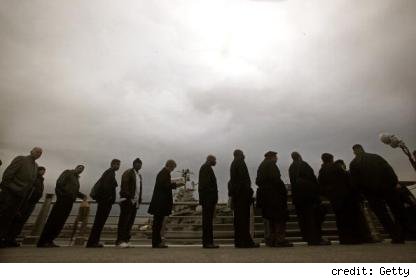
By Freddie Allen
NNPA Washington Correspondent
WASHINGTON (NNPA) – For the second month in a row, the Black unemployment rate decreased, and the economy added more than 200,000 jobs, according to the Labor Department.
The unemployment rate for Blacks decreased slightly from 11.6 percent in April to 11.5 percent in May and was two percentage points lower than the 13.5 percent rate recorded a year ago. Meanwhile, the jobless rate for Whites barely rose from 5.3 percent in April to 5.4 percent in May.
While the jobless rate for Black men over 20 years old increased from 10.8 percent to 11.5 percent in May, the unemployment rate for White men decreased from 5.1 percent to 5.0 percent.
Black women continued to make modest gains in the job market this year. The unemployment rate Black women fell from 10.4 percent to 10 percent in May, compared to White women who saw their jobless rate climb from 4.7 percent to 4.9 percent last month.
Last year, more Blacks and Whites were either working on looking for jobs, a measure recorded as the labor force participation rate. In May 2013, that rate was 61.7 percent for Blacks and 63.8 percent for Whites. Now, the participation rate is 60.8 percent for Blacks and 63.1 percent for Whites.
Even though the national unemployment remained flat at 6.3 percent from April to May, 217,000 people found work.
According to the Labor Department, the health care and social assistance industries experienced big gains in May.
“The health care industry added 34,000 jobs over the month, twice its average monthly gain for the prior 12 months,” stated the Labor Department’s monthly report. “Employment rose by 21,000 in social assistance, compared with an average gain of 7,000 per month over the prior 12 months.”
Even as the nation limps through the current economic recovery, Black unemployment remains much higher than it was before the Great Recession.
During December 2007, as jobs evaporated from the economy and the Great Recession began, the Black unemployment rate was 9 percent and the labor force participation rate was 63.3 percent.
In a statement on the latest jobs report, Chad Stone, chief economist for the Center on Budget and Policy Priorities, said that the job losses suffered during the Great Recession have been erased.
“There are now 620,000 more jobs on private payrolls and 113,000 more jobs on total payrolls than there were at the start of the recession in December 2007,” wrote Stone. “Because the working-age population has grown over the past six and a half years, however, the number of jobs remains far short of the number of jobs needed to restore full employment.”
Stone said that long-term unemployment, roughly a third of all people who are unemployed, remains a significant concern. Blacks are more likely to suffer long periods of unemployment, compared to Whites.
Many economists have called for Washington lawmakers to restore emergency federal unemployment insurance, a critical resource for millions of Americans that ended abruptly in December 2013 amidst partisan gridlock. Last year, almost 1 million Blacks received benefits through the unemployment insurance program. This is money that families use to buy groceries, help pay rent and get to job interviews.
“Emergency UI [unemployment insurance] not only provides needed financial support to jobless workers and their families, but also keeps long-term unemployed workers in the labor force looking for work rather than dropping out,” said Stone. “On a bang-for-the-buck basis, it’s also one of the best ways to stimulate demand and strengthen the job market. That policymakers let it lapse was a tragedy.”

